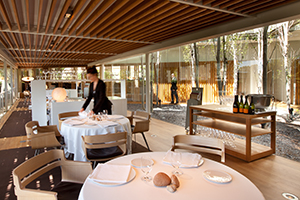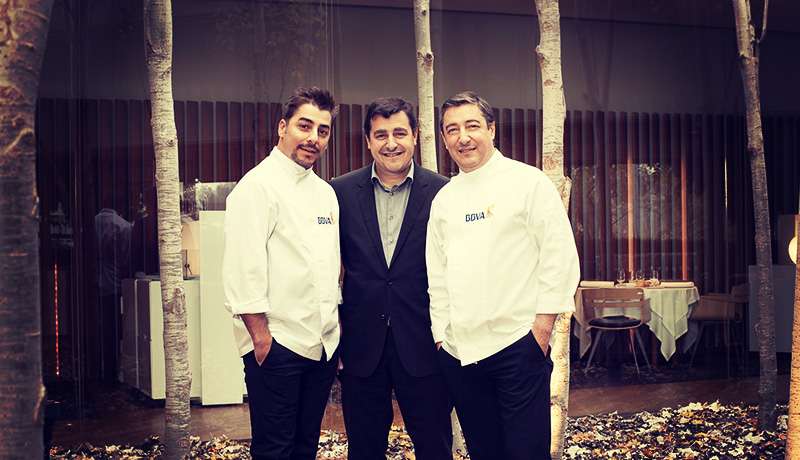
The world of high-level gastronomy is dominated by an elite few. In the United States, the names are widely known — folks like Thomas Keller, Grant Achatz, José Andrés and Daniel Boulud. In Europe, and within the upper echelons of the food world, the Roca Brothers are some of the true culinary rock stars.
Joan, Josep and Jordi Roca are the siblings behind the critically acclaimed El Celler de Can Roca in Girona, Spain. Joan is the head chef while Josep serves as sommelier and Jordi specializes in pastries. The restaurant was a favorite for years, but in 2013 and 2015, it became even more popular when U.K.-based trade publication Restaurant Magazine named it the number one restaurant in the world.
So, what do you do when you’re at the top of your game and the only direction to look is down? In 2014, the Roca Brothers did what would have previously been unthinkable: For over a month, they closed their restaurant and took the entire staff on an adventure that would ultimately become a three-year, multi-stop, world-wide tour sponsored by BBVA Compass.
At each city, the brothers re-created the experience in their own establishment for several hundred BBVA Compass clients, effectively allowing these guests to circumvent their 11-month waitlist. Last year, the brothers visited the United States, Mexico, Colombia and Peru. In 2015, they shared their culinary love in Buenos Aires, Miami, Birmingham and Houston before concluding in Istanbul on September 3. Forbes Travel Guide caught up with them during their stop in Texas to get a first-hand glimpse of their extraordinary experience and to discuss trends, lessons learned and plans for next year.
Congratulations on getting named the world’s number one restaurant in 2015. Last year you took the tour on the road for the first time. Do you think this trip helped elevate your status to gain number one again?
Joan: It’s possible. It’s possible especially because of the innovative nature of the initiative. It is something that has never been done before. It also has encouraged other chefs to follow suit and have similar experiences and seek new sources of inspiration. It’s also very intensive, because we’re not just traveling and visiting restaurants; it’s not like a vacation. We’re actually working and we’re actually cooking. In that regard, it’s been a very enriching experience. So, I suppose that it may have been a turning point, and it may have influenced the judges.
Do you see world tours as a culinary trend then?
Joan: Certainly. We have demonstrated that it is actually possible to take a restaurant on the road. But in our case, it has been made possible thanks to BBVA Compass. And we have demonstrated something that, maybe, a couple of years ago seemed impossible. I remember talking to some of our colleagues about the idea of doing such a tour, and they thought that we had gone crazy. So, we demonstrated that not only is it possible, but it’s actually a very enriching and fantastic experience for us — to take the restaurant on the road, to travel with our team and it’s possible that we may have set that trend.
How did you approach the tour differently, other than changing the stops on the tour, from last year?
Joan: The experience from last year was very useful, so we drew some valuable lessons, definitely, but I don’t think the aspects have changed dramatically. It was definitely a huge learning experience for us. If anything, it had a very positive impact in our teamwork, the atmosphere of our team. Sometimes now, the staff in the dining room [has] to help out in the kitchen and vice versa. And there’s a very nice cohesion among the team members, and the relationship has definitely been enhanced.
Josep: This year, we have fewer services compared to last year. We found that last year was a little bit too exhausting, and we want the team to be able to enjoy the tour as well, so we have fewer services. Last year was four weeks. This year we are on tour for five weeks, allowing for a little bit more downtime at each stop, so that people are able to have a break. At the end of the tour, we will also have a week to take vacation and have a rest so we can come back to the restaurant with our batteries fully charged.
Share something you’ve taken away from this world tour experience that really pops in your mind as “Wow, I would never have experienced this unless we did this.”
Josep: We wouldn’t have been able to discover and see first-hand, for instance, the tremendously rich heritage in Mexico that we were able to experience on our scouting trip in Oaxaca, Mexico. I was able to meet Mezcal producers and see how it’s made first hand. [We met] coffee producers in Colombia and potato growers in Ayacucho [too]. I was able to go to Argentina and really have a really amazing experience with wine producers and wine makers down there. Being able to meet indigenous people from the north of Argentina in their very special environment [was memorable]. And also, in Miami and Houston, we’ve been able to see this fusion of Latin American cuisines.
Expand a bit more on this fusion of Latin American cuisines. Something you haven’t experienced before?
Jordi: We’ve particularly seen this in Miami. Miami is a like a melting pot of Latin American cuisines — very, very diverse. A lot of Cuban, but also Colombian, Venezuelan, Mexican, Brazilian and Japanese — a full array of different styles, different cuisines set in a very fun atmosphere. You can have a taco and an asado (a Venezuelan fish) and be able to experience these at the same location, the same restaurant.
You’ve tried to replicate your restaurant at each of the dinner services. What haven’t you been able to re-create?
Joan: Our concept is that our restaurant is wherever our team is, not just the three brothers, but wherever our team goes. That’s where our restaurant is. We want to bring that more intangible value — human elements — regardless of the décor and other aspects. We want to somehow seduce the patrons that come to the dinner services. And we want to seek a source of inspiration. And we want to really transmit and really communicate a love that comes from all of us at El Celler de Can Roca to our guests.
Jordi: Something else that is very important and that is missing [are] our parents. Our parents, if they were able to be here, would be truly icing on the cake. Usually when we’re back in Girona, they’re able to put out fires. If something doesn’t work, we always have our parents around. So this is almost like a true experience of emancipation for us. We have our own restaurant in Girona, but they’re always there to help us out. Now, we’re on our own.
Next year, you’re going on tour again for the last time on your three-year journey. Do you have insights on where you’ll be going?
Josep: We don’t know yet for sure. For me, it would be Chile, California and, maybe, somewhere in Asia. We would like to return to South America. I would also like to go to California to experience the wine and the gastronomy, which is similar to ours but with influences from the Pacific.



